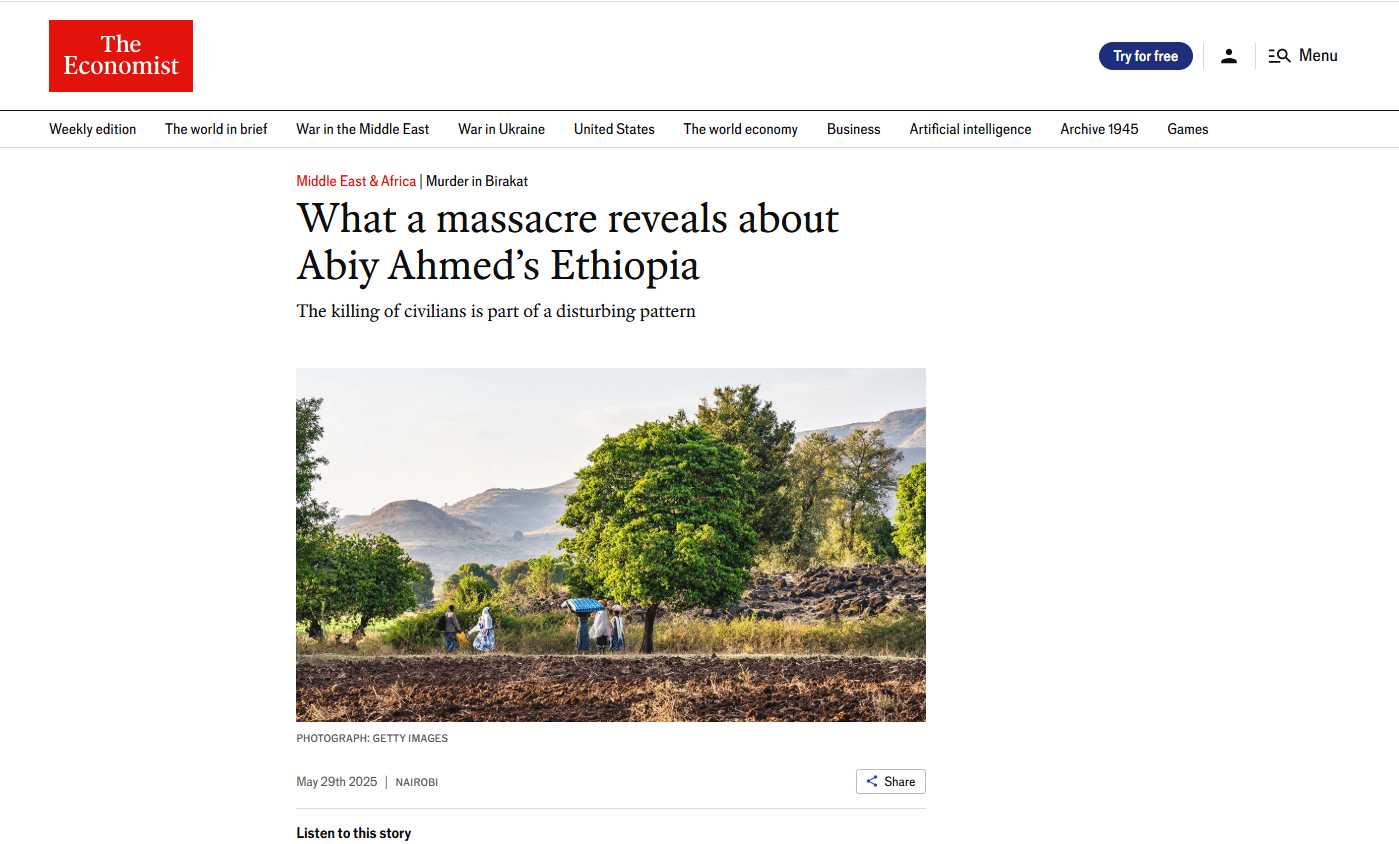The killing of civilians is part of a disturbing pattern

May 29th 2025|NairobiShareListen to this story
Listen to this story
Two months ago, in the early afternoon of March 31st, gunfire erupted in Birakat, a town in the Amhara region of northern Ethiopia (see map). Panicked residents ran for cover as the Ethiopian army battled local militias. Five hours later the guns fell silent, briefly. But after the army had taken control of the town, according to three eyewitnesses, a massacre began.

In teams of four to six men, the soldiers combed through the town, dragging people from their homes and rounding them up in the streets. One man saw four women made to kneel outside the bus station, with their hands behind their heads. Four soldiers then shot them from behind. The same man later watched a different group of soldiers kill a priest outside his church. Another witness, returning to Birakat the following morning, saw piles of corpses in the streets. He counted 56 bodies, his brother among them. The Ethiopian army did not respond to multiple requests for comment on this story.
The events in Birakat add to mounting evidence that what is unfolding in Amhara resembles the abuses committed by the army and other armed groups during the war in Tigray, the region next door, where hundreds of thousands of people were probably killed between 2020 and 2022. They also shed light on the increasingly reckless approach to security taken by Abiy Ahmed, Ethiopia’s prime minister since 2018.
Since 2023 Ethiopia’s government has been in conflict with the Fano, a loose coalition of rebel groups that claim to be fighting for the interests of the Amhara, Ethiopia’s second-largest ethnic group. The government has trained and equipped local militias to help its soldiers fight them. Yet the anti-Fano fighters are also Amhara, and there is little trust between them and the regular army. Asres Mare Damte, a Fano commander, claims plenty have defected to join the Fano.
The forces with which the government clashed in Birakat on the day of the massacre were anti-Fano militias, some of whom, Mr Asres claims, have since joined the rebels. It is plausible that Ethiopian soldiers, suspecting local militias of collaborating with their enemies, sought revenge by killing anyone they could find.
That fits a disturbing pattern of reprisal attacks against civilians. In January 2024 government troops summarily executed dozens of civilians in the town of Merawi, some 20km west of Birakat, according to an investigation by Human Rights Watch (HRW), an international monitor. Those killings followed an attack by the Fano on government forces.
During the war in Tigray the Ethiopian army killed at least 70 civilian men and boys in the town of Bora, according to a UN investigation, after an attack on their camp by Tigrayan rebels in December 2020. The following month Ethiopian troops frogmarched dozens of unarmed Tigrayan men to the edge of a cliff near the town of Mahbere Dego, where they filmed themselves shooting their captives and flinging their corpses over the precipice. On May 14th of this year the African Union’s human-rights body held a hearing in a case accusing the army of extrajudicial killings, torture and sexual violence in Tigray.
Mr Abiy’s spokesperson declined to comment on this story. The government has previously denied that its soldiers committed atrocities in Tigray and promised to investigate individual instances of alleged abuses. It says it is preparing to launch a transitional-justice programme to prosecute all war crimes committed in Ethiopia since 1995. But independent observers say the process is a charade. “Ethiopia has stalled and hampered any hope that those most responsible will be held to account,” says Laetitia Bader, HRW’s Horn of Africa director.
In part, civilians are suffering the consequences of Mr Abiy’s approach to holding the country together. Since 2019 his army has been bogged down fighting various ethnic insurgencies. Some of his generals have publicly complained that their troops are exhausted.
Mr Abiy has repeatedly tried to solve the problem by drafting in poorly trained militias. This has tended to backfire. The Fano, for instance, were Mr Abiy’s allies during the war in Tigray before becoming his enemies. In Oromia, which borders Amhara, his government relies on a dizzying array of Oromo militias to fight the Oromo Liberation Army, another ethno-nationalist rebel group. Rebels and militiamen have been known to swap sides. Many are bandits more than fighters. Murder, theft and kidnapping are rampant.
The anarchy allows Mr Abiy to divide and discredit his enemies, which arguably strengthens his hand. But it also erodes the authority of the Ethiopian state, potentially threatening his grip on power. Mr Abiy may see method in the madness. Ethiopians are paying the price. ■

